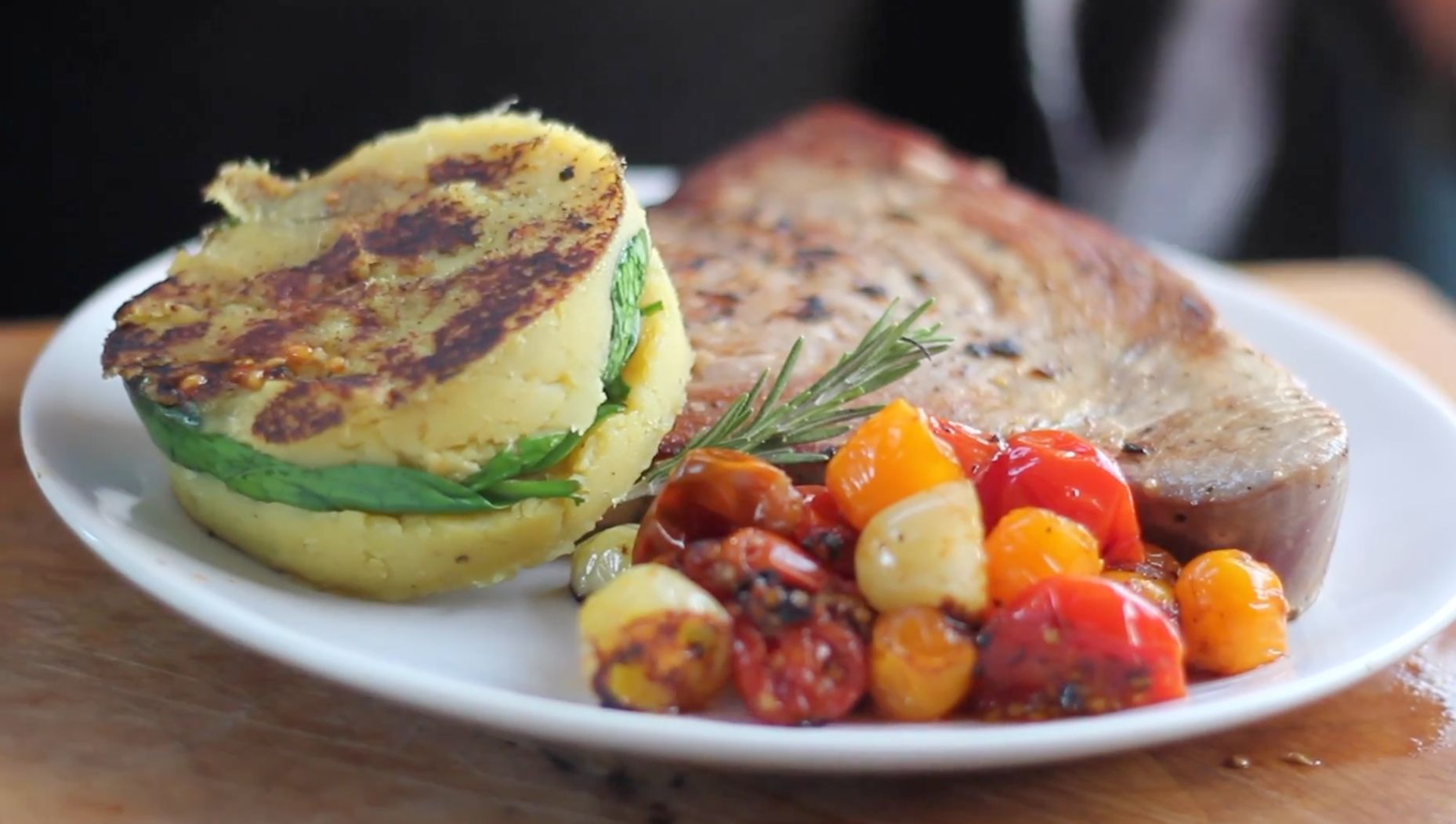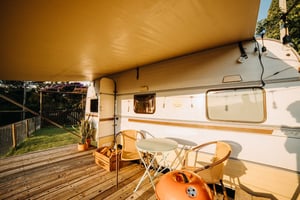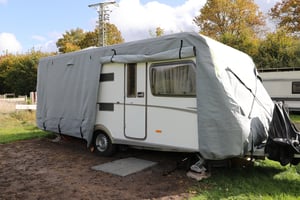The top 10 must-have gadgets for your caravan

Campervan Cooking Adventures - Michael from @ChefCampers

The Cold November Rain
I only welcome those words when sung by Axl Rose of Guns N’ Roses. Unfortunately, I’m referring to the UK’s typical weather. The kind that seeps into your bones, rattles the roof of your van, and turns every morning into a battle between condensation and motivation.
It can be tough living in a campervan during these times. The nights are long and power-hungry. The lights, the heater, and the laptop all take their share, and the solar panels don’t have any spare change to give back. You start counting every amp hour, turning off lights a little sooner, cooking a little faster, and bundling up in layers that never quite dry. The rain becomes a soundtrack, sometimes soothing, sometimes relentless. And the van, that warm, mobile freedom machine of summer, can start to feel small. Restrictive, even.
But there’s a way to escape this.
You just have to keep driving.
Drive until the clouds thin, until the light changes from grey to gold. Drive until you open the van door in the morning and the air feels soft again. Drive where the weather suits your late-summer clothes. Where lunch can be eaten outside and the butter melts too easily. Somewhere you worry more about whether it’s too early for a glass of wine than how much diesel is left in the heater tank. You will need that diesel, just not so much.
If you’re looking for somewhere that isn’t Benidorm, somewhere that still feels wild and real, then the Algarve might just be the answer.

Where Winter Feels Like a Pause, Not an Ending
It’s hard to explain just how startling the difference is. Back in the UK, November means headlights on by four o’clock, drizzle that never seems to stop, and that smell of damp wool that clings to everything along with the jet noise of a heater. Down here, the Algarve still feels like it’s halfway through summer.
The mornings begin with a gentle haze over the sea, a slow warming that makes you want to wander down to the water barefoot. The air tastes faintly of salt and eucalyptus. By midday, you’re squinting under the sun, and by late afternoon, the sky turns that pale pink that seems to last for hours. The light feels wider, slower, kinder. It’s always welcome at my table.

You don’t realise how heavy British winter feels until you leave it behind. Here, you wake with sunlight, not alarms. You dry your towels outside. You find yourself sitting still longer at a café, on a harbour wall, or beside your van with the door open and a mug of coffee warming your hands. That’s probably my favourite place.
The locals call this time of year “the quiet season”, but it never feels dead. Instead, it’s calm in the best way. Markets are still open, the beaches are near-empty, and the roads are lined with orange trees heavy with fruit. The ocean is cold but clear, and on some days you’ll see wetsuited surfers gliding across waves.
Olhão — The Soul of the Algarve
Of all the towns scattered along this coast, Olhão is the one that holds my attention. It’s not a resort. It’s a working town, alive with history and a kind of grit that makes it feel honest. It’s the spot I recommend to everyone visiting the Algarve. It’s truly Portugese and makes me wonder what the whole coast would have been like before British tourism took off.
It grew from the sea. For centuries, Olhão has lived and breathed the tides. Fishing, canning, and salting its way through generations.

The waterfront is framed by two old red-brick market halls, the Mercado de Olhão. They’re impossible to miss, standing like sentinels beside the Ria Formosa lagoon. Inside, mornings are a performance of sound and scent. Fishmongers calling out the day’s catch, knives tapping against boards, the metallic scent of salt and sea. Stalls are stacked with tuna so fresh the flesh still glistens, squid laid out like pale ribbons, and baskets of clams still clinking softly together.
The produce market next door is just as rich. Heaps of tomatoes, oranges, almonds, and the kind of olive oil that smells green and alive. Old women sell herbs bundled in string, and you can buy a dozen eggs with straw still clinging to the shells. Step outside and there’s always someone drinking espresso, smoking a cigarette, and watching the world unfold at its natural pace. I will sometimes stop for a cheeky pastel de nata. They aren’t like the ones in Lidl.
It’s a place that moves at the speed of the tide, not the clock. It’s pleasant.

The first time I bought tuna in Olhão, I thought the fishmonger had handed me steak. Thick-cut, deep red, the kind of flesh that looks like it means business. He wrapped it in brown paper, slapped it down with a nod, and pointed toward the harbour where his boat was still rocking in the swell. That’s the rhythm of this place, sea to market, market to plate, all within a few hours. It’s a Chef’s dream.
Pair that fish with something from the land market next door and you can have a real plate of the Algarve.
A Different Kind of Winter
Evenings settle softly here. The air cools, the light fades slowly, and you can sit outside long after the fire has burned down to coals. Somewhere in the distance, a dog barks. The smell of grilled fish drifts through the air. It’s peaceful in a way that the British countryside rarely is at this time of year, not silent, just content.
While the rest of Europe hunkers down in wool jumpers and raincoats, you’re sitting by the van with the door open, barefoot, a plate balanced on your lap and the sound of the Atlantic somewhere in the dark.
For me, that’s the real reward of chasing the sun south. It’s not just escaping the cold, it’s finding a new way to live through winter. A way that still involves campfires, good food, and that quiet joy that comes when you realise, “ you’ve traded drizzle for daylight.”
Seared Tuna with Sweet Potato & Spinach Cake and Charred Tomatoes
Food tastes different when the air is warm and the light lingers. Down here, simple cooking feels enough. A single pan, a few good ingredients, and time, that’s all you really need. This dish came straight from the Mercado de Olhão, cooked over the small gas hob beside the van with the door open to the sea breeze.

Ingredients (serves 2)
2 thick tuna steaks, about 180–200g each
2 medium sweet potatoes, peeled and cut into chunks
2 large handfuls of fresh spinach
8–10 cherry tomatoes (or a handful of small vine tomatoes)
1 small garlic clove, finely chopped
½ lemon, juice and zest
Olive oil
Sea salt and black pepper
(Optional: a pinch of smoked paprika or chilli flakes for a bit of warmth)

Method
Season the tuna and sear it for around 2 minutes either side.
Slice the tomatoes in half and char in the pan, alongside the tuna
Mash sweet potato with garlic sauteed spinach and fry in the pan. I like to use a cooking ring so it holds the shape. These can be made in advance and stored in the fridge!
Drizzle the tuna with a lemon and garlic dressing, mixed with olive oil.
Sprinkle some smoked paprika over the tomatoes.

To Serve
Place the tuna in the middle of the plate. Rest the potato cake on top or just alongside, and spoon over the charred tomatoes. Finish with lemon zest, a drizzle of olive oil, and a crack of pepper.
Eat it while the tuna is still warm and the tomatoes are just starting to release their juice.

ChefCampers Note:
This is one of those recipes that tastes of where you are. The tuna has the Atlantic written all over it, the sweet potato carries the warmth of the earth, and the tomatoes remind you that the sun still has something left to give in November!







